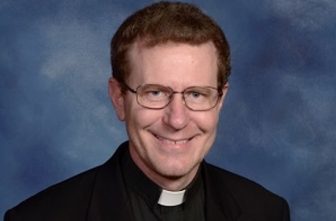In our Gospel for the 24th Sunday in Ordinary Time, Peter asks Jesus how many times he must forgive another. Peter suggests “seven times” as an attempt on his part to be generous, surpassing the common Jewish view that forgiving the same offense just a few times was sufficient. However, Jesus responds that he must forgive not seven times but “77 times.” This response is hyperbole, a number that essentially means “without limitation.” There is no limit to God’s forgiveness, and so there should be no limit to the forgiveness we extend to others.
To illustrate his teaching, Jesus then tells the parable of the unforgiving servant who was forgiven a “huge amount” by his king. This expression falls short in English. Scripture scholars translate this phrase from the Greek as literally “a myriad of talents,” a myriad being 10,000 talents. A talent was worth 6,000 denarii. A single denarius was a typical day’s wages. Hence, Jesus’ parable doubles down on his command to forgive without limitation, as the servant who was forgiven his debt was forgiven wages that would span hundreds of lifetimes. In other words, Jesus is saying the servant was forgiven a debt he could never repay. Of course, this is where we stand with God.
Then we are jolted into indignation when Jesus describes this same servant refusing to forgive a “much smaller amount” he was owed by a fellow servant. The king throws that unforgiving servant into prison and pain “until he should pay back the whole debt.” Jesus declares this is how we will be judged if we do not forgive one another “from the heart.” That is to say, we must always forgive others and truly mean it — we must will it.
Does this mean we must feel warm, affectionate feelings while forgiving another? No. Authentic, true love is an act of the will, not our emotions. Emotions can be difficult to control. Authentic love consists in willing the good of another, as St. Thomas Aquinas teaches. So too, to forgive another is also an act of love and an act of the will, or to put it another way, an act of “the heart.” Jesus thus commands us to forgive from the heart — which means we can, with the grace of God, make an act of the will to forgive another by willing their good (including their salvation) even when it feels all but impossible to “like” that person at the moment or feel warm feelings.
In the Lord’s prayer we pray for God to “forgive us our trespasses as we forgive” others. This means if I do not forgive others, I am actually praying that God would not forgive me. We get what we give — if we give forgiveness, we will receive it from God. If we give condemnation, that is what we will get from God.
We should also manifest our forgiveness by communicating it to another, which can become the beginning of healing in the relationship. How do I know I’ve forgiven another? Praying for the person we will to forgive is the surest sign we have heeded our Lord’s command to “forgive … from the heart.”
Deacon Gannon is director of the St. Paul Seminary Institute for Ongoing Clergy Formation. He is ordained for the Diocese of La Crosse and lives in Prescott, Wisconsin, with his wife, Lisa, and four children. He holds a law degree and a masters in theology from Holy Apostles College and Seminary. Deacon Gannon teaches at the seminary, the Archbishop Harry J. Flynn Catechetical Institute and in deacon formation programs.
Sunday, Sept. 17
24th Sunday in Ordinary Time
Readings





